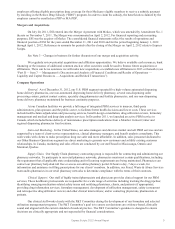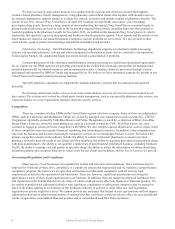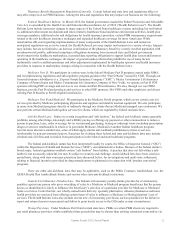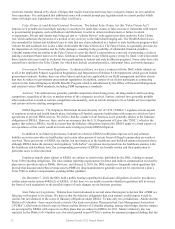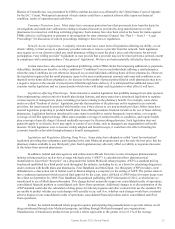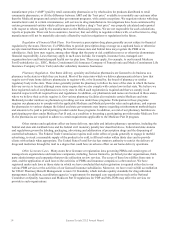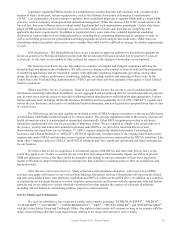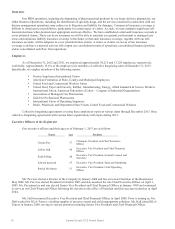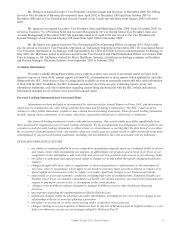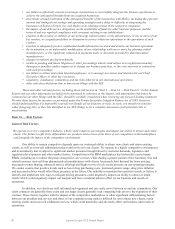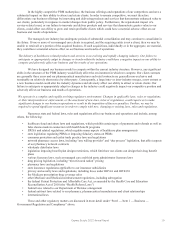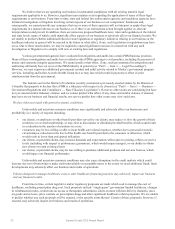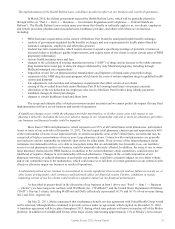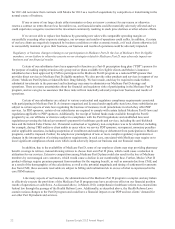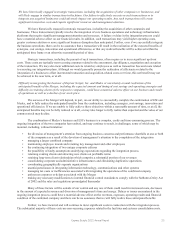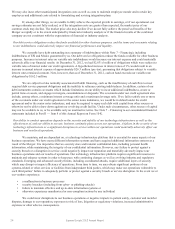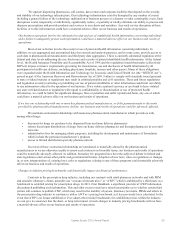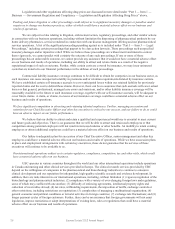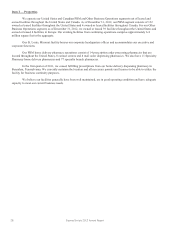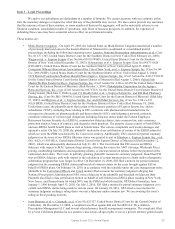Express Scripts 2012 Annual Report Download - page 21
Download and view the complete annual report
Please find page 21 of the 2012 Express Scripts annual report below. You can navigate through the pages in the report by either clicking on the pages listed below, or by using the keyword search tool below to find specific information within the annual report.Express Scripts 2012 Annual Report 19
Q
Q
Q
Q
Q
Q
Q
Q
Q
Q
Q
In the highly competitive PBM marketplace, the business offerings and reputations of our competitors can have a
substantial impact on their ability to attract and retain clients. In order to remain competitive, we must therefore
differentiate our business offerings by innovating and delivering products and services that demonstrate enhanced value to
our clients, particularly in response to market changes from public policy. Furthermore, the reputational impact of a
service-related event, or our failure to innovate and deliver products and services that demonstrate greater value to our
clients, could affect our ability to grow and retain profitable clients which could have a material adverse effect on our
business and results of operations.
The managed care industry has undergone periods of substantial consolidation and may continue to consolidate in
the future. If one or more of our managed care clients is acquired, and the acquiring entity is not a client, then we may be
unable to retain all or a portion of the acquired business. If such acquisitions, individually or in the aggregate, are material,
they could have a material adverse effect on our business and results of operations.
The delivery of healthcare-related products and services is an evolving and rapidly changing industry. Our failure to
anticipate or appropriately adapt to changes or trends within the industry could have a negative impact on our ability to
compete and adversely affect our business and the results of our operations.
We have designed our business model to compete within the current industry structure. However, any significant
shifts in the structure of the PBM industry would likely affect the environment in which we compete. Our client contracts
are generally three years and our pharmaceutical manufacturer and retail contracts are generally non-exclusive and
terminable on relatively short notice by either party. Consequently, a large intra- or inter-industry merger, a new entrant or
a new business model could alter the industry dynamics and adversely affect our ability to attract or retain clients. Our
failure to anticipate or appropriately adapt to changes in the industry could negatively impact our competitive position and
adversely affect our business and results of operations.
We operate in a complex and rapidly evolving regulatory environment. Changes in applicable laws, rules or regulations,
or their interpretation or enforcement, or the enactment of new laws, rules or regulations, could require us to make
significant changes to our business operations or result in the imposition of fines or penalties. Further, we may be
required to spend significant resources in order to comply with new, changing or existing laws, rules and regulations.
Numerous state and federal laws, rules and regulations affect our business and operations and include, among
others, the following:
Q healthcare fraud and abuse laws and regulations, which prohibit certain types of payments and referrals as well as
false claims made in connection with health benefit programs
Q ERISA and related regulations, which regulate many aspects of healthcare plan arrangements
Q state legislation regulating PBMs or imposing fiduciary status on PBMs
Q consumer protection and unfair trade practice laws and regulations
Q network pharmacy access laws, including “any willing provider” and “due process” legislation, that affect aspects
of our pharmacy network contracts
Q wholesale distributor laws
Q legislation imposing benefit plan design restrictions, which limit how our clients can design their drug benefit
plans
Q various licensure laws, such as managed care and third party administrator licensure laws
Q drug pricing legislation, including “most favored nation” pricing
Q pharmacy laws and regulations
Q state insurance regulations applicable to our insurance subsidiaries
Q privacy and security laws and regulations, including those under HIPAA and HITECH
Q the Medicare prescription drug coverage rules
Q other Medicare and Medicaid reimbursement regulations, including subrogation
Q the federal Patient Protection and Affordable Care Act, as amended by the Health Care and Education
Reconciliation Act of 2010 (the “Health Reform Laws”)
Q federal laws related to our Department of Defense arrangement
Q federal antitrust laws related to our pharmacy, pharmaceutical manufacturer and client relationships
Q international laws
These and other regulatory matters are discussed in more detail under “Part I — Item 1 — Business —
Government Regulation and Compliance” above.


